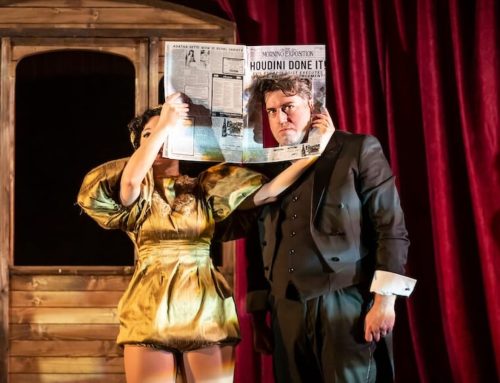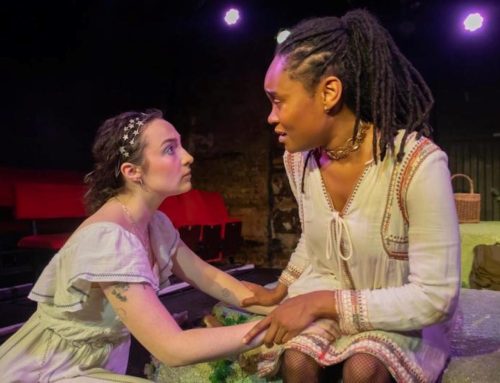Lucy, the early 30s protagonist of Kim Cormack’s sincere, thought-provoking comedy drama The Big O, has anorgasmia. The term refers to delayed, infrequent, less intense, or in Lucy’s case entirely absent orgasms during sex. It is not that she does not try. The character has only been single for a month or two since the age of 14 and enjoys a capacious amount of casual sex. She is a self-described “bad bitch”: which in her case means a self-sabotaging, self-serving, female fuckboy who uses men with the same casual disregard that some men inflict on women. But something still stops her from climaxing. “Your pussy isn’t Voldemort” a typically unsympathetic interlocutor tells her, so just what is the problem?
Lucy, played with intense and brutal honesty by a tremendous Jade Dowsett Roberts, is on a journey to figure just what has brought her to the dark place she is in. The play’s strongest scenes unfold in the interactions between the deeply conflicted hero, grief-stricken at the loss of the only boyfriend who comes close to understanding her, and psychotherapist Dinah (a warm and engaging Anna Bernard). What emerges in these therapeutic encounters are long suppressed traumas; the childhood rape of her sister at the hands of a stepfather delivers a shocking foreshadowing of later events in Lucy’s own life. Her panic attacks, depression and PTSD are subsumed under a cocktail of mood enhancing medication, brief sexual encounters, and hopeless denial. She has never allowed herself to howl, either in pain or pleasure, through fear of losing control entirely. Something has to change.
Director Lotte Ruth Johnson’s sparse set features a single bed, on and around which much of the action takes place. It is a suitable choice: a bed is where Lucy feels most at home, as a place both of refuge and of transient affirmation from men. But it is also a kind of prison, trapping the flawed protagonist in a doom-loop of self-loathing, sexually transmitted disease, and unwanted pregnancy. It is to Cormack’s credit that she never lets her character fall into the trap of victimhood. Many of Lucy’s traumas stem from the action of the men around her, but the poor choices she makes in response are all her own. She is hard to love because she sets out, consciously or otherwise, to make herself unlovable. She demands respect from others but offers none to herself. This is a character with whom it is easy to empathise but hard to like.
Cormack does not let Lucy’s frequent sexual conquests off the hook either, offering wry observations about male behaviour towards women with anorgasmia. Some view the fact their partner fails to climax as a personal affront to their manhood. Others wilt like dying flowers when confronted with the truth that Lucy has been faking it all along. Yet others see it as a technical problem to be solved by deftly experienced lovemaking.
Where the play works least well is in the overlong comedic encounters between Lucy and university friends Dee (Lisa Spencer) and Annie (Esmee Cook). Neither character feels real or believable, which leaves their role in the work as foils, accentuating Lucy’s voracious need for physical affirmation without adding anything to the narrative. Particularly jarring too is a resolutely unfunny scene in which the sequin-clad duo, aided by Lucy’s only platonic male friend Harry (Adley Lewis), parade her sex toys around the stage rather like items on a TV shopping channel.
Ultimately this is Lucy’s story, and one wonders how much in her life is more broadly true for other women with female orgasmic disorder. But as an authentic exploration of one flawed woman’s life, and of coming to terms with past pain, The Big O mostly delivers.
Writer: Kim Cormack
Director: Lotte Ruth Johnson
More Recent Reviews
Playfight. Soho Theatre.
Writer Julia Grogan’s breathtakingly assured debut play arrives at Soho Theatre following stellar reviews at the Edinburgh Fringe and [...]
All The Happy Things. Soho Theatre.
Naomi Denny’s three-hander comedy-drama All The Happy Things covers familiar themes within a recognisable premise. A grieving protagonist comes [...]
Telly. Bread and Roses Theatre.
The challenge with absurdist comedy is that many people do not find it funny. Laughing at the sheer weirdness [...]






